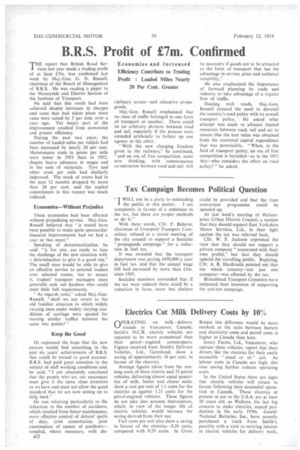B.R.S. Profit of £7m. Confirmed
Page 56

If you've noticed an error in this article please click here to report it so we can fix it.
Economies and Increased Efficiency Contribute to Trading Profit : Loaded Miles Nearly 20 Per Cent. Greater
THE report that British Road Seri vices last year made a trading profit of at least £7m. was confirmed last week by Maj.-Gen. G. N. Russell, chairman of the Board of Management of B.R.S. He was reading a paper to the Merseyside and District Section of the Institute of Transport.
He said that this result had been achieved despite increases in charges and costs that had taken place since rates were raised by 5 per cent. over a year ago. The major part of the improvement resulted from economies and greater efficiency.
During the past two years, the number of loaded miles per vehicle had been increased by nearly 20 per cent. Maintenance costs in pence per mile were lower in 1953 than in 1952, despite heavy advances in wages and in the cost of materials. Tyre and other costs per mile had similarly improved. The stock of stores had in the past 12 months dropped by more than 20 per cent, and the capital commitment in this respect was much reduced.
Economies—Without Prejudice
These economies had been effected without prejudicing service. Maj.-Gen. Russell believed that "it would have been possible to make quite spectacular financial improvements had we had a year or two more."
Speaking of denationalization, he said: "1, for one, am ready to face the challenge of the new situation with a determination to give it a good run." The small man would be able to give an effective service to selected traders over selected routes, but to secure it, traders' transport managers must generally seek out hauliers who could meet their full requirements.
" As regards rates," asked Maj.-Gen. Russell, "shall we not revert to the old familiar situation in which widely varying rates under widely varying conditions of carriage were quoted for moving similar traffics between the same two points""
Keep the Good
He expressed the hope that the new pattern would find something in the past six years' achievements of B.R.S. that could be turned to good account. B.R.S. had paid great attention to the subject of staff working conditions and, he said, "1 am absolutely convinced that the people who arc our successors must give it the same close attention as we have and must not allow the good standard that we are now setting up to slid q back," He was referring particularly to the reduction in the number of accidents, which resulted from better maintenance, more effective control of drivers' spells of duty, joint consultation, joint examination of causes of accidents— coupled, where necessary, with dis B22 ciplinary action—and educative propaganda.
Maj.-Gen. Russell emphasized that no class of traffic belonged to one form of transport or another. There could be no arbitrary division between road and rail, especially if the process were intended artificially to bolster up one agency or the other.
" With the new charging freedom given to the railways," he continued, "and an era of free competition, some new thinking, with commonsense co-operation between road and rail, will be necessary if goods are to be attracted to the form of transport that has the advantage in service, price and technical suitability."
He also emphasized the importance of forward planning by trade and industry to take advantage of a regular flow of traffic.
Dealing with roads, Maj.-Gen. Russell stressed the need to dovetail the country's road policy with its overall transport policy. He asked what attempt was made to allocate limited resources between road, rail and air to ensure that the best value was obtained from the restricted capital expenditure that was permissible. "When, in the field of transport policy, an era of free competition is heralded—as in the 1953 Act—who considers the effect on road policy? " he asked.




































































































